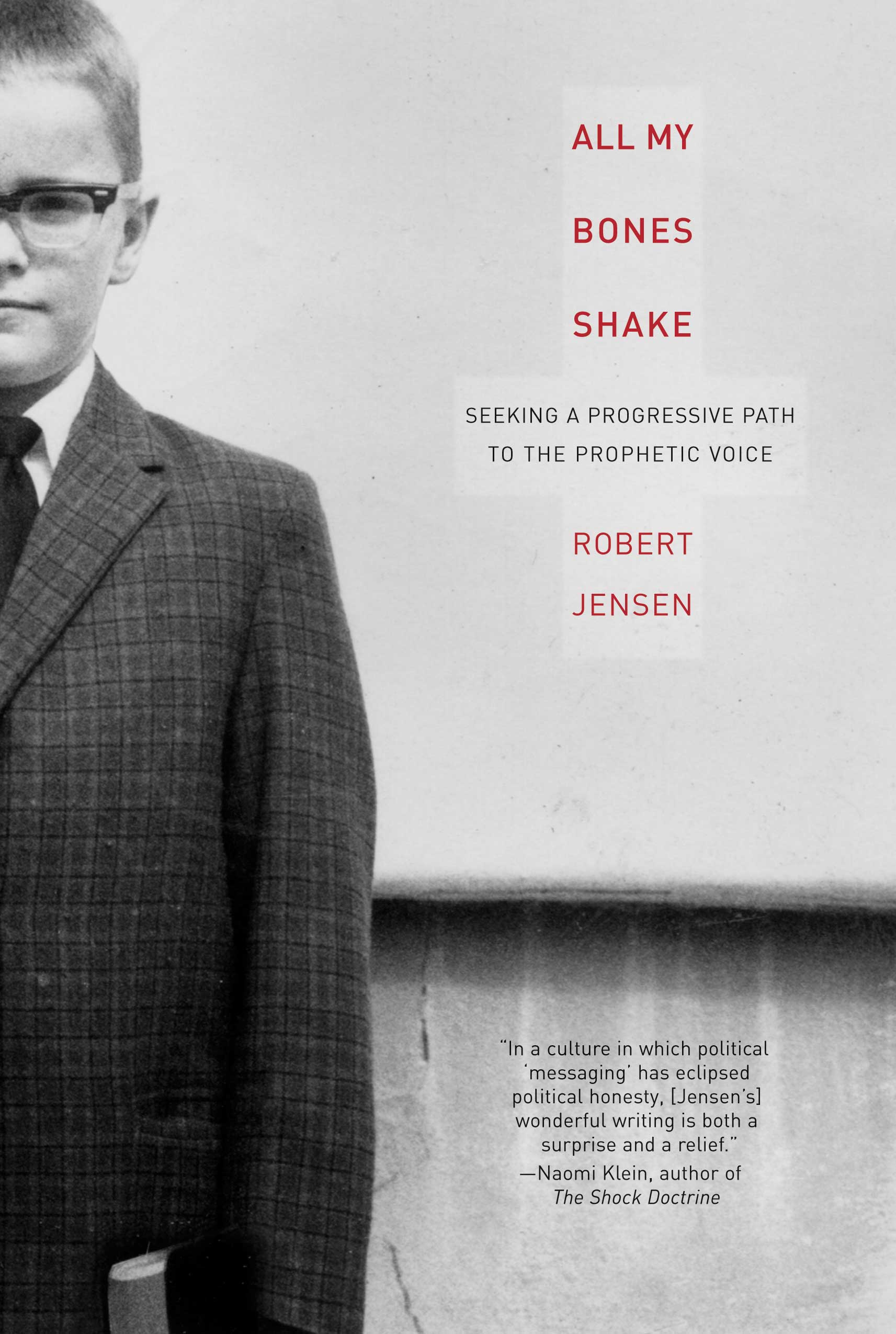 Robert Jensen is an associate professor at the University of Texas at Austin School of Journalism and author of the personal memoir All My Bones Shake: Seeking a Progressive Path to the Prophetic Voice
Robert Jensen is an associate professor at the University of Texas at Austin School of Journalism and author of the personal memoir All My Bones Shake: Seeking a Progressive Path to the Prophetic Voice, a compelling memoir that highlights the religious debate currently raging in the United States. I had the chance to contact Dr. Jensen to discuss some of the themes he raised in his book.
What prompted you to write All My Bones Shake: Seeking a Progressive Path to the Prophetic Voice?
After many years of working in secular left/feminist political movements, during which I had always avoided religion, I met a radical minister in Austin, Jim Rigby, and started talking with him about progressive approaches to Christianity and religion. The more we talked, and the more we organized political events at the church, the more I started thinking about religion in new ways. I realized that my distaste for a religion had led me to ignore approaches to theology that would resonate with me. Those experiences led me to write the book, on the assumption that others are searching in similar ways.
How did your interest in politics motivate you to join St. Andrew's Presbyterian Church?
My initial interest was primarily political, part of a more general search for spaces in which people could come together to think about radical politics in a world structured by such profound inequality. I found St. Andrew's hospitable to that project, but I also realized that it was more than a place to organize political events.
When people call you a "Christian" how do you respond?
A lot of people want to know whether I'm a "real" Christian or not. By that, they want to know whether I hold supernatural beliefs (believing in the idea that God is an actual being, entity, or force; and believing that the resurrection of Christ was an actual historical event). Since I don't hold supernatural beliefs, and I approach Christianity as a belief system that makes use of myth, symbolism, and poetry, there's sometimes a lively discussion about whether I should call myself a Christian. For me, the point is not so much to answer the question as to start a discussion about what people believe and the consequences of belief for action in the world.
What draws you to keep coming back to church?
St. Andrew's remains a place where I work politically, but it's also become much more. The text and tradition are a rich source of wisdom, and I find church to be a place where I learn a lot, from Rev. Rigby and from other members of the congregation. Instead of a place where I come only to influence others, it's a place I come to be educated. I also find it a comforting space, both in the ways I am part of a community and I can be alone. For me, church is both a place to connect to others and to find solitude.
In your book All My Bones Shake, you stated "These are end times, of a sort. I am not talking about rapture and tribulation, but about rupture and triangulation." Can you elaborate what you meant by this statement?
I think more and more people recognize that we live in an unsustainable system in ecological terms. We can't continue to draw down the ecological capital of the planet indefinitely -- we have created a rupture with the larger living world. That's not an apocalyptic vision, a claim about the rapture, but a recognition of reality. To make sense of it we have to triangulate, to ponder the problems from many perspectives, rather than sink into a narrow interpretation of one tradition. If religion is to be of value in helping us deal with these multiple crises, we have to overcome the fear-driven interpretations so common in conservative/fundamentalist Christianity. But I think we should recognize that we live in a crazy system, and a fear of what's ahead is real and reasonable.
Can you unpack what you mean by the statement, "[O]ur only hope is that there is no God, and more than ever we need to serve the One True Gods?"
As a tribal species, we humans are rooted in community, a relatively small group. That's most of our history as a species. At the same time we now recognize ourselves as one human family on the planet. To me, those are our "gods" in a sense -- the commitment to people we love up close, and the commitment to universal values that apply to every single person on the planet. Yet in this world, we are pushed to declare loyalty to the nation and the corporation, which in these terms are false gods. We have to develop a theology and politics that allow us to reject the false gods and nurture our commitment to those one true Gods.
How do you feel Christians can be a prophetic voice in the public sphere?
In my understanding, the call to speak in the prophetic voice is the call to critical self-reflection and honesty. We have an obligation to look critically at ourselves and the systems in which we live, and then speak honestly, even when there are risks. To do that, we need not speak with arrogance or in narrow sectarian terms. We can speak of the universal values that animate all moral and theological systems and hold ourselves and our society accountable.
 Becky Garrison is featured in the documentaries The Ordinary Radicals and Nailin' it to the Church.
Becky Garrison is featured in the documentaries The Ordinary Radicals and Nailin' it to the Church.
Got something to say about what you're reading? We value your feedback!